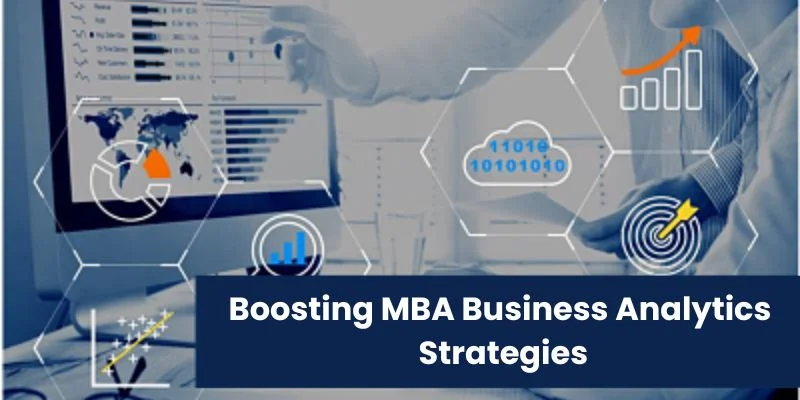
In today’s data-driven world, the contribution of Business Analytics has become more crucial than ever. With big data, businesses seek professionals to analyze complex data sets for actionable insights. An MBA in Business Analytics blends business acumen with analytical skills, preparing graduates for success in this evolving field. In this blog, we will explore is MBA in Business Analytics good, the scope of the field, effective business analytics strategies, and the steps to become a successful business analyst.
Is an MBA in Business Analytics Good?
An MBA Business Analytics in Chennai is an excellent choice for individuals who are passionate about data and want to leverage it to drive business decisions. Here are some reasons why this degree is a worthwhile investment:
- High Demand for Skilled Professionals: As businesses realize the benefits of data-driven decision-making, the need for business analysts is expanding rapidly. Business analytics MBA graduates are in great demand across several sectors, including technology, healthcare, retail, and finance.
- Lucrative Career Opportunities: Because of their specialized expertise and the substantial influence they have on corporate performance, business analysts frequently command large pay. Industry reports state that business analysts typically make far more money than the ordinary American.
- Broad Skill Set: An MBA in corporate Analytics offers a well-rounded education by fusing cutting-edge analytical methods with corporate management concepts.
- Leadership and Management Training: In addition to technical skills, MBA programs emphasize leadership and management training. This prepares graduates to take on leadership roles and drive strategic initiatives within their organizations.
Scope of Business Analytics
The Business Analytics scope is vast and continually expanding as technology advances & data becomes more integral to business operations. Below is the MBA in Business Analytics scope.
- Data-Driven Decision Making: By using data insights rather than hunches or educated guesses, business analytics helps firms to make well-informed decisions. Better risk management, more precise forecasting, and enhanced performance all result from this.
- Customer Insights and Personalization: Through the analysis of customer data, companies can obtain profound understandings of the needs, preferences & behavior of their customers. Developing customized marketing campaigns, improving client experiences, and boosting customer loyalty all benefit greatly from this knowledge.
- Operational Efficiency: Business analytics helps identify inefficiencies in business processes and operations. By streamlining these processes, organizations can reduce costs, increase productivity, and improve profitability.
- Competitive Advantage: By swiftly adjusting to market changes, spotting new opportunities, and outpacing rivals, businesses that use business analytics can obtain a competitive edge. This is an important MBA in Business Analytics Scope.
- Risk management: By using advanced analytics to anticipate possible risks and difficulties, firms can take proactive measures to mitigate them and lessen their effects. This is especially crucial in sectors where risk management is essential, including banking and healthcare.
Business Analytics Strategies
Implementing effective business analytics strategies is essential for maximizing the value of data and driving business success. To learn these strategies in detail, enroll in MBA Coaching Near Me. Here are some key strategies to consider:
- Define Clear Objectives: Before exploring the data analysis, it’s essential to define clear objectives and key performance indicators (KPIs). This ensures that the analysis is aligned with business goals and provides actionable insights.
- Invest in the Right Tools and Technologies: The right analytics tools and technologies are essential for collecting, processing, and analyzing data efficiently. Invest in robust data analytics platforms, business intelligence tools, and data visualization software to enhance your analytics capabilities.
- Foster a Data-Driven Culture: Encourage a data-driven culture within your organization by promoting data literacy and training employees on the importance of data analytics. Ensure that data is accessible to all stakeholders and integrated into decision-making processes.
- Utilize Predictive Analytics: Predictive analytics uses historical data to forecast future trends and behaviors. Implementing predictive models can help businesses anticipate customer needs, optimize operations, and make proactive decisions.
- Leverage Machine Learning and AI: Machine learning and artificial intelligence can significantly enhance business analytics by automating complex data analysis tasks and uncovering patterns that might be missed by traditional methods. Incorporate these technologies to gain deeper insights and improve decision-making.
- Monitor and Evaluate Performance: Continuously monitor and evaluate the performance of your analytics initiatives. Use dashboards and reporting tools to track KPIs and make necessary adjustments to your strategies based on the results.
How to Become a Business Analyst?
Becoming a successful business analyst needs a combination of education, skills, and practical experience. Let’s discover how to become a Business Analyst after MBA.
- Obtain a Relevant Degree: The first stage is to obtain a bachelor’s degree in business, finance, computer science, or a similar discipline. It is strongly advised to join a Business Analytics Training in Chennai for enhanced knowledge and professional prospects.
- Develop Analytical Skills: It’s important to be proficient in data mining, statistical analysis & data visualization. Learn how to use programs like Tableau, R, Python, SQL, Excel, and other analytical software.
- Obtain Real-World Experience: Gainful practical experience can be obtained through internships and entry-level jobs in business analysis or related disciplines. Engage in real-world projects to put your analytical abilities to use and acquire useful knowledge.
- Obtain Certifications: Professional certifications, such as Certified Business Analysis Professional (CBAP) or Certified Analytics Professional (CAP), can enhance your credentials and demonstrate your expertise to potential employers.
- Keep Up with Industry Trends: The discipline of business analytics is fast developing. Attending industry conferences, webinars, and joining professional organizations keep you updated on trends, tech, and best practices.
- Make Connections and Network: Making connections with industry professionals can open up a world of possibilities for professional development, job referrals, and mentoring. Connect with peers and professionals by joining industry groups and online forums.
Obtaining an MBA in Business Analytics provides access to numerous profitable and stimulating employment options. For aspiring business analysts, acquiring the right education, developing essential skills, and gaining practical experience are key steps to success. You can learn the Business Analytics Strategies in detail at MBA Business Analytics Colleges in Chennai. Embrace the journey, stay curious, and let data be your guide to making impactful business decisions. In this blog, we examined the importance, strategies, and scope of an MBA in Business Analytics.
